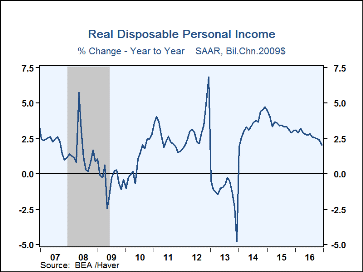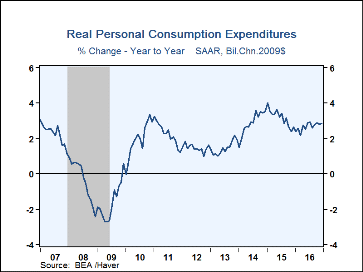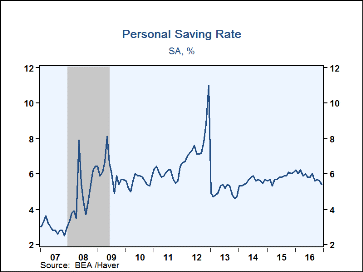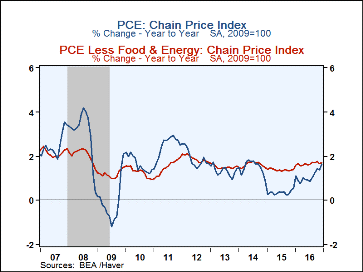 Global| Jan 30 2017
Global| Jan 30 2017U.S. Personal Income & Spending Strengthen M/M
by:Tom Moeller
|in:Economy in Brief
Summary
Personal income increased 0.3% (3.5% y/y) during December following a 0.1% November uptick, initially reported as no change. A 0.4% rise had been expected in the Action Economics Forecast Survey. During all of 2016, income grew 3.5%, [...]
Personal income increased 0.3% (3.5% y/y) during December following a 0.1% November uptick, initially reported as no change. A 0.4% rise had been expected in the Action Economics Forecast Survey. During all of 2016, income grew 3.5%, the weakest rise since 2013. Wages & salaries rebounded 0.4% last month (3.6% y/y) after a 0.1% slip. Rental income surged 1.0% (7.3% y/y), but proprietors' income remained unchanged (2.0% y/y). Transfer receipts increased 0.3% (3.3% y/y) as Social Security benefits rose 0.3% (1.8% y/y) and Medicare payments improved 0.2% (4.7% y/y). Unemployment insurance benefits jumped 2.1%, but were down 8.2% y/y.
Disposable personal income increased 0.3% (3.7% y/y) following a 0.1% rise. Adjusted for price inflation, take-home pay edged 0.1% higher (2.1% y/y).
Personal consumption expenditures jumped an expected 0.5% (4.5% y/y). It was the strongest rise in three months. During all of last year expenditures rose 3.8%. In constant dollars, spending improved 0.3% (2.8% y/y). Real durable goods purchases increased 1.4% (8.1% y/y) as motor vehicle purchases rebounded 2.4% (8.7% y/y). Real spending on recreational goods & vehicles strengthened 1.0% (11.7% y/y), and furniture & appliance buying ticked 0.1% higher (5.4% y/y). Real nondurable purchases remained unchanged (2.1% y/y). Real apparel purchases jumped 0.5% (0.8% y/y), but real gasoline spending fell 0.3% (-2.2% y/y), down for the third straight month. Real spending on services rose 0.3% (2.2% y/y) as housing & utilities outlays jumped 1.2% (2.3% y/y). Real recreation services spending also increased 1.5% (0.3% y/y), but food services & accommodations outlays rose 1.1% (+0.6% y/y).
The personal savings rate declined to 5.4%, its lowest level since March 2015. Personal saving declined 8.0% y/y.
The chain price index increased 0.2% (1.6% y/y). The nondurable goods price index rose 0.2% (1.2% y/y). The durable goods price index was little changed (-2.5% y/y), while the services price index gained 0.2% (2.4% y/y). The price index excluding good & energy inched 0.1% higher (1.7% y/y).
The personal income & consumption figures are available in Haver's USECON database with detail in the USNA database. The Action Economics figure is in the AS1REPNA database. Further detail is in USNA.
| Personal Income & Outlays (%) | Dec | Nov | Oct | Dec Y/Y | 2016 | 2015 | 2014 |
|---|---|---|---|---|---|---|---|
| Personal Income | 0.3 | 0.1 | 0.5 | 3.5 | 3.5 | 4.4 | 5.2 |
| Wages & Salaries | 0.4 | -0.1 | 0.5 | 3.6 | 4.2 | 5.1 | 5.1 |
| Disposable Personal Income | 0.3 | 0.1 | 0.5 | 3.7 | 3.8 | 3.8 | 5.1 |
| Personal Consumption Expenditures | 0.5 | 0.2 | 0.4 | 4.5 | 3.8 | 3.5 | 4.4 |
| Personal Saving Rate | 5.4 | 5.6 | 5.7 | 6.1 (Dec '15) |
5.9 | 5.8 | 5.6 |
| PCE Chain Price Index | 0.2 | 0.1 | 0.3 | 1.6 | 1.1 | 0.3 | 1.5 |
| Less Food & Energy | 0.1 | 0.0 | 0.1 | 1.7 | 1.7 | 1.4 | 1.6 |
| Real Personal Consumption Expenditures | 0.3 | 0.2 | 0.1 | 2.8 | 2.7 | 3.2 | 2.9 |
| Real Disposable Income | 0.1 | 0.0 | 0.2 | 2.1 | 2.7 | 3.5 | 3.5 |
Tom Moeller
AuthorMore in Author Profile »Prior to joining Haver Analytics in 2000, Mr. Moeller worked as the Economist at Chancellor Capital Management from 1985 to 1999. There, he developed comprehensive economic forecasts and interpreted economic data for equity and fixed income portfolio managers. Also at Chancellor, Mr. Moeller worked as an equity analyst and was responsible for researching and rating companies in the economically sensitive automobile and housing industries for investment in Chancellor’s equity portfolio. Prior to joining Chancellor, Mr. Moeller was an Economist at Citibank from 1979 to 1984. He also analyzed pricing behavior in the metals industry for the Council on Wage and Price Stability in Washington, D.C. In 1999, Mr. Moeller received the award for most accurate forecast from the Forecasters' Club of New York. From 1990 to 1992 he was President of the New York Association for Business Economists. Mr. Moeller earned an M.B.A. in Finance from Fordham University, where he graduated in 1987. He holds a Bachelor of Arts in Economics from George Washington University.










